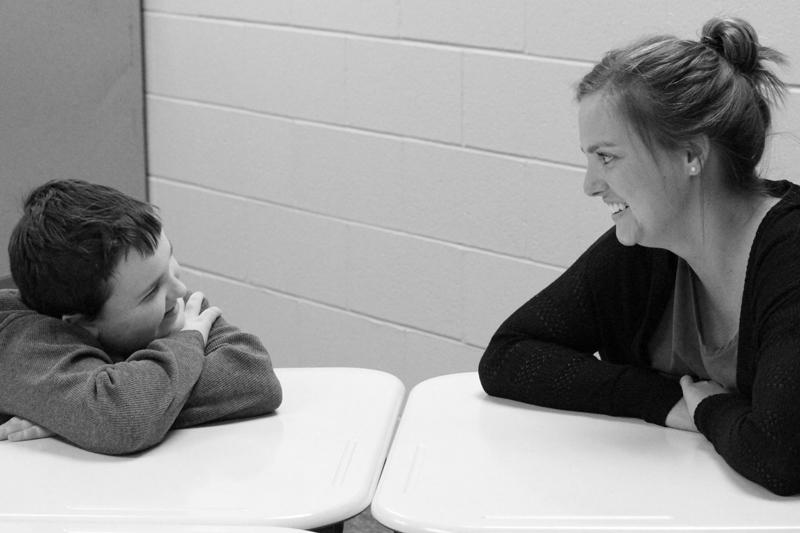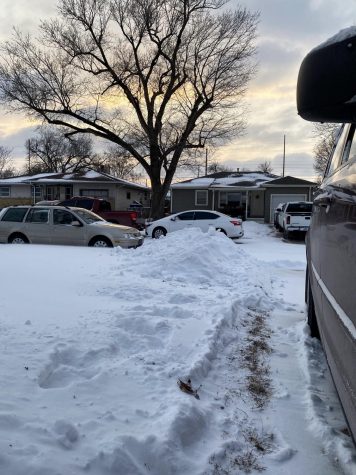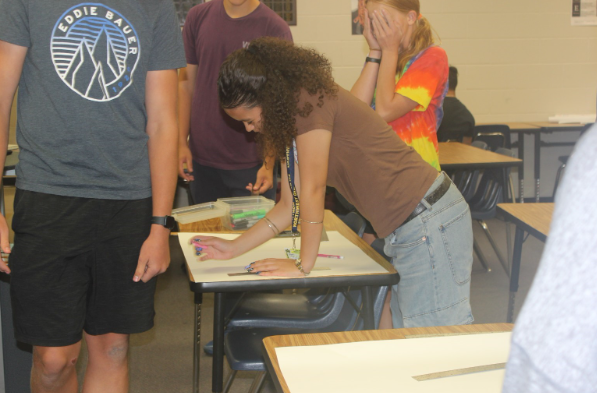Bridging the gap
Autistic son of Northwest staff member finds new line of communication through Maize South personnel
Ashton Latta wants to make you laugh, even if that means playing the same joke 20 (or 30, or 40) times. He plans on being married by the time he’s 25, a father at 30, and a grandfather at 50. Even though his father is a Wildcat fan, Ashton supports the Jayhawks. He performs academically at the same level as, or even above, his fellow 7th grade classmates.
Ashton also has autism, which prevents him from being able to communicate effectively. He can answer questions that require one word answers but can’t respond to open ended questions. Ashton has never been able to hold a “typical” conversation with anyone.
It pains his father and Site Technology Specialist Brian Latta to see his son unable to verbally express himself because of his social impairment.
“He wants to communicate, he wants to tell us about his day, he wants to have friends,” Brian said. “He wants to do all of those things, but he knows his disability is going to hold him back from those and he gets anxious and upset.”
Brian sometimes finds it difficult to understand why Ashton feels anxious or upset since he can only give one word explanations.
“My wife has the patience of Job,” Brian said. “She’s amazing so she never really gets frustrated with him. It’s really hard for me because I want to sit there and talk to him and have a conversation like we’re having.”
While he still can’t have a conversation in this way, Ashton has recently discovered an alternative that has changed his family’s lives: Brian is now able to effectively communicate with his son for the first time in 13 years via email.
“He’s in a computer class so that’s how he’s able to email me, my father, his grandfather, and my wife, his mom,” Brian said. “He’s able to email us every day about his day.”
Shari Luebbe, structured learning teacher at Maize South Middle, has set higher expectations for Ashton than previous teachers and has been patient while he reaches them. Brian credits her strategy for many opportunities that are opening up for his son, including making friends for the first time.
“Any students that maybe aren’t following the general curriculum but they need a voice, that’s our job,” Luebbe said. “That’s our job to figure out what’s needed and what we can do. You always look at a student’s strengths and then you go from there: how can we channel that?”
Autism is characterized by impaired social interaction, which has prevented Ashton from forming many relationships in the past. This became evident as early as when Ashton was eight months old.
“He wouldn’t crawl, he wouldn’t reach, he didn’t want to be held, he didn’t really want to be touched,” Brian said. “If you put a toy out in front of him he wouldn’t reach out and grab it. He just showed no signs of connecting with either his mother or I.”
With help from the structured learning staff at Maize South, though, Ashton has been able to form more relationships than ever before.
“He keeps everything lively and happy,” para Kristen Brown said. “He’s pretty social. He loves being around the other students. He loves to gives pats on the back, high fives.”
Brian hopes that every child with disabilities discovers their own way to thrive.
“I see it here at school, I see it everywhere where kids are really smart,” Brian said. “It’s just a matter of finding a way of getting it out of them. And that’s what great teachers do. They find a way to open them up and allow them to learn and be a part of the school. That’s what Maize South has done so well for Ashton.”
Luebbe says the credit doesn’t belong to her–it takes a village.
“I can’t do my job without all of my support staff,” Luebbe said. “We can’t do our job without great parents and students, as well as other peers and administration. It’s a team effort.”
Madeliene Rainbolt, a structured learning para who has worked for two school years with Ashton, agrees on the importance of a supportive community. She also emphasizes the importance of changing perspectives on children with disabilities.
“They’re children first,” Rainbolt said. “That’s a really important thing to remember if that’s not a population that you work with all the time. A lot of people who don’t spend a lot of time with our students look at them and see the disability. It’s really important to remember that they’re human beings with dignity and feelings, strengths and weaknesses.”
Brian recognizes his son’s weaknesses, but he’s thrilled that Ashton is learning to manage them.
“He still has communication issues, that’s never going to go away. He still has anxiety issues, that’s never going to go away. But at least now he’s able to function in a school setting, and be like a normal kid with friends.”





